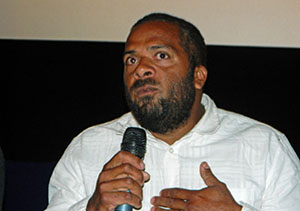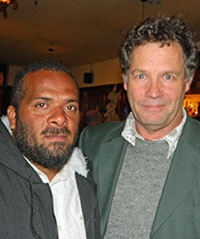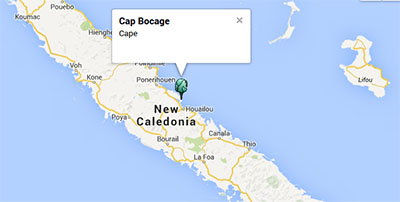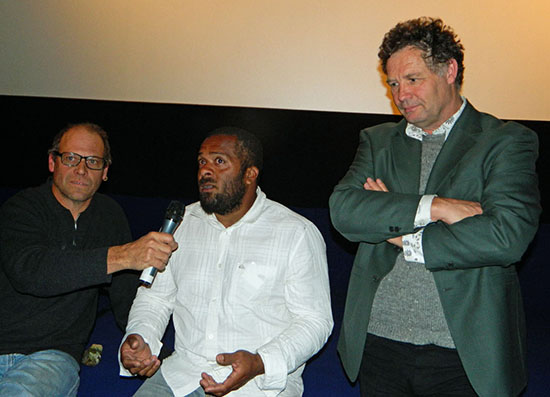
AUCKLAND (Pacific Media Watch): Indigenous Kanak people in the Cap Bocage area of New Caledonia have "lived in mud and shit for 30 years" as a result of the actions of the Ballande family mining group, a new environmental documentary film reveals.
Cap Bocage: When A Mountain Fell Into The Sea held its world premiere in Auckland at the New Zealand International Film Festival this week.
Directed by AUT television and screen production lecturer and filmmaker Jim Marbrook, the documentary features Kanak environmental activist Florent Eurisouké as he campaigns in an attempt to hold Ballande accountable over a devastating mudslide which polluted a pristine coral reef.
According to an independent inquiry, the company failed to maintain its mine properly, leading to a pond of toxic minerals, including manganese, nickel and cobalt, bursting and then causing a mudslide for almost 20 km down the mountain and into the Kanak fishing grounds.
A list of different species was found to have died, making fishing almost impossible.
 Shot in New Caledonia over seven years, the film zeroes in on the nickel mining industry on the country's main island, Grande Terre, which is home to about one quarter of the world's nickel reserves.
Shot in New Caledonia over seven years, the film zeroes in on the nickel mining industry on the country's main island, Grande Terre, which is home to about one quarter of the world's nickel reserves.
With one open cast mine per kilometre for 11 km, the miners are referred to in the film as "land rapers", and their mines as "holes of death" with catastrophes situated below.
Repairing damage
After the mudslide of 2008, Eurisouké was elected by his community to lobby to get Ballande to repair the damage it had caused.
Independent French scientists speaking to Marbrook in the documentary say that the toxic mud should have been cleaned up right away.
According to Eurisouké, the company first agreed to work with the community but then dragged its heels, forcing the community to blockade the mine until it cleaned up the reef. The film shows independent marine ecology and mining experts being initially thwarted by Ballande, which was allegedly reluctant to spend much money on the clean-up operation, instead proposing to dig away the toxic mud with their own machinery and building a coastline road.
Ballande also offered the community $1.9 million to "forget about the mudslide", which the community rejected.
Eventually, Ballande approached the courts to stop the community from blockading the mine. But the courts instead appointed an expert to investigate the mudslide and upheld the validity of Ballande's original agreement with the community to clean up the toxic mess.
Today, the reef has been cleaned up and there are new mining laws but as Eurisouké points out, there are still no guarantees that further mining disasters will be cleaned up immediately.
Eurisouké told the audience after the screening that Ballande had used many "dirty tricks" against the community. With most of the community being employed by the mine, Ballande officials tried their best to divide people and pit them against each other, Eurisouké said.
"This is much worse than a confrontation with a gun because it [causes problems that] last for generations," he said. Refining problem
Refining problem
Another problem is that ore is now being refined in New Caledonia by a Brazilian company instead of being sent overseas for processing, meaning that a massive new acid processing plant now poses additional environmental risks.
However, Eurisouké has successfully sued this company for 40 million Pacific Francs (just under NZ$1 million), and this money will be used for environmental projects.
In 2008, UNESCO recognised the territory's coral reefs as a World Heritage site.
Eurisouké said the Kanak people would never give up their struggle against polluting multinationals, and called for solidarity from people in the rest of the world.
The film shone a light on the ongoing struggle of the indigenous Kanak people against their French colonisers.
"The problem with the French is that they always want to be first. Everywhere they have been, they have had a great impact on indigenous people," said Eurisouké.
"We are not here to decorate roundabouts or show people Kanaky sculptures," Eurisouké says. He is still fighting to close the mine completely, even though it has now expanded.
His community's defiant struggle was welcomed by a Māori speaker at the screening, who said that she too would have no choice but to defend her ancestral mountain if it was destroyed in the same way as the land on New Caledonia.
The documentary was made with the support of Creative New Zealand, NZ Film Commission and AUT's Pacific Media Centre.

NZ International Film Festival link
Earlier PMC YouTube interview about the film
This work is licensed under a Creative Commons Attribution-NonCommercial 3.0 New Zealand Licence.




